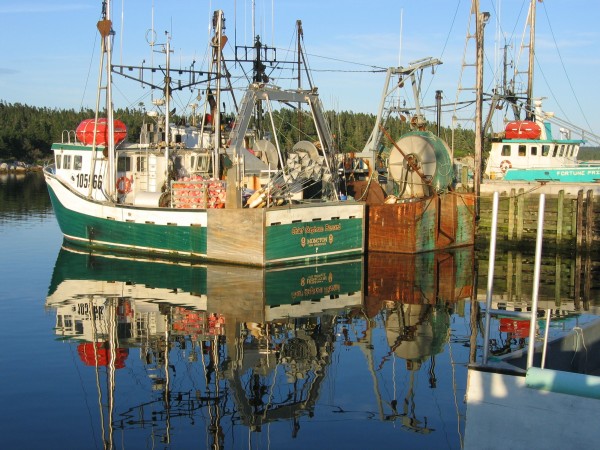Team NAFO 2013: Accountability Doesn’t Come Cheap
By Scott Biggar, Research Intern WWF-Canada
This past summer I had the opportunity to become a member of a Community Supported Fishery (CSF) here in Halifax. On Saturday mornings, I would pick up my weekly share—one whole fish, scales and all. Some weeks it would be cod, other weeks haddock. The fish would be caught on Friday mornings in the Bay of Fundy, and then delivered to CSF members within 24 hours.
Yes, I paid a bit more for this service. If I had bought the equivalent amount of fish somewhere else, I could have saved a few dollars. Which begs the question—what was I paying for?
Aside from the experience of receiving freshly caught fish, what I believed I was paying for was accountability. I knew where, when and how my fish had been caught, who caught it, and how it travelled to my plate. This knowledge afforded me peace of mind because I knew how the catch was being managed.

As part of the NAFO team at WWF, I’ve spent the last few months looking at this same subject: catch management. In recent years, the Northwest Atlantic Fisheries Organization (NAFO) has been making an effort to improve the management of its fisheries. Yet despite this effort there are still many knowledge gaps in catch data and fish stock assessments. NAFO datasets are riddled with discrepancies, and the organization is not regulating its members adequately enough to ensure good data collection. Without this information, how can we say with certainty just how much we’ve fished or—and this is perhaps the more pressing question—how much fish is left?
The trouble with NAFO is the same trouble that plagues most international fisheries organizations. There are resources in the sea, but these resources have not been managed responsibly. Now countries must decide whether they feel it prudent to fish less, or to simply maintain the unsustainable status quo.
The truth is that the Grand Banks and other fragile marine ecosystems in NAFO waters will not survive the status quo. This is why WWF stepped in as an observer to NAFO in 2005, so that damaged species like Atlantic cod and American plaice could see an improved chance of recovery. Recovery is a slow process, and the only way to manage it effectively is to collect and maintain sound, science-based data.
NAFO does not require its member countries to have scientific observers on their vessels. Even if vessels do have these observers, they are not responsible for providing their findings to NAFO. Many species that are heavily fished currently lack the necessary scientific assessment criteria to make sound management decisions. Despite this, decisions are still being made, which means one of two things: that these stocks are being overfished, or that there is room to sustainably fish more, and thus increase profits for vessels.
One might think that the incentives for improved data collection are clear. Increased knowledge is usually an asset for organizations—except for those that prefer the status quo. In NAFO’s case, the status quo means continuing to collect inconsistent fisheries data without having a system to verify that they are is accurate. Scientific data collection in fisheries costs money, and the findings could result in decreased quotas for countries. Therefore if some countries choose to stick to the current system, they can avoid this risk while still following the rules.
Unfortunately for NAFO, accountability will cost them money. Much like the premium I paid for knowing where my fish comes from, member countries of NAFO are going to need to pay to increase the quality of their own data collection. The return on their investment won’t be immediate—the benefits of sustainable fishing come to fruition over time. Fish stocks are given adequate time to reproduce, after which they can continue to be harvested.
It’s a long term model that can negate short term monetary gain, and getting countries on board will be one of NAFO’s biggest challenges. WWF will continue to emphasize the importance of science-based decision making, with the hope that the countries who operate under NAFO will share the same vision for sustainable fishing.
